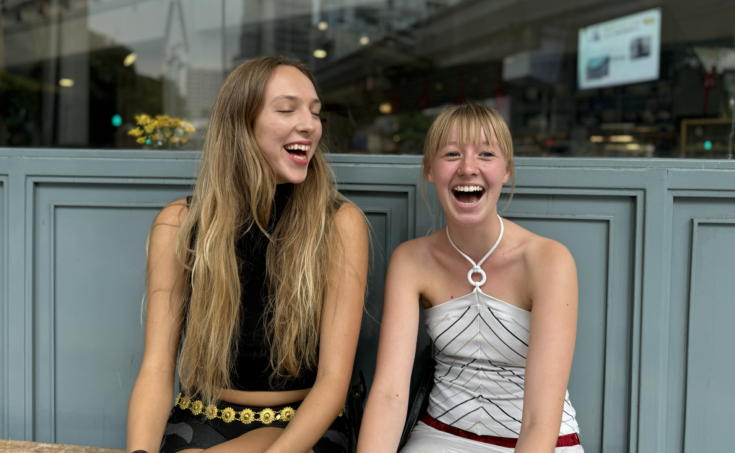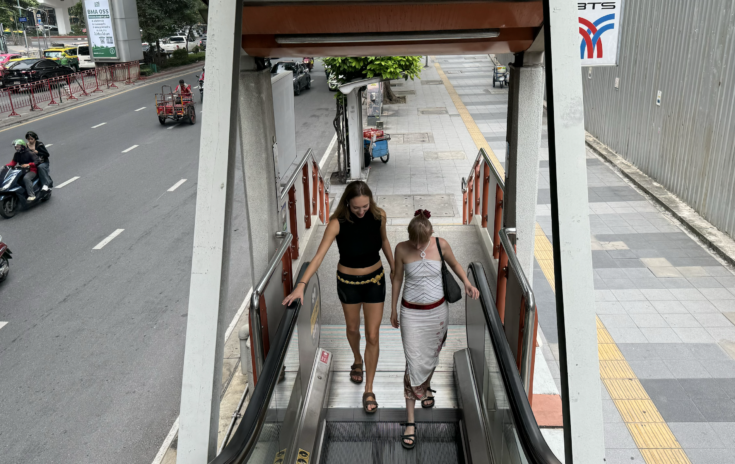
Amid the chaotic hustle and bustle of Bangkok’s airport, Rebecca Schou and Liva Friis Agergaard embark on a cultural exploration in Thailand. They find themselves standing in a sea of tourists. The aroma of the warm, humid air and the buzz of myriad languages fill the airport as they wait for their luggage, marking the start of their two-week cultural exploration in this vibrant, dynamic city.
Outside the airport, they are greeted with warm smiles by Nicolaj Stubbe Hørlyck, the new Danish pastor in Bangkok, and his wife. The couple ushers them to the Danish Church House, their home for the duration of their research.
“I knew Nicolaj from back home. I saw that he was moving on from Brorsons Kirke, and when I reached out to see what he was up to next, we managed to arrange this stay. We had to submit a request to the church council, and they kindly allowed us to stay for free during the 14 days we are here,” Liva explains about their choice of Thailand.
Initially, the duo considered conducting their study in India, where Liva had connections with several NGOs. However, communication hurdles and logistical challenges led them to pivot toward Bangkok, where the Danish Church could offer vital support and a unique opportunity for cultural immersion.
Cultural exploration abroad
“As third-year students at Roskilde Gymnasium’s International Line, they were eager to embrace the opportunity to conduct field studies abroad, a chance that has led their classmates to diverse destinations such as Tokyo, Spain, and Germany. Rebecca noted, ‘Only two stayed in Denmark because they couldn’t afford the travel,’ highlighting the significant personal investment involved in their academic pursuits.
The self-funded nature of their journey makes them particularly grateful for the accommodation offered by the church. In return, they actively contribute to the community. “We’ve been helping out during services while also exploring aspects relevant to the church’s mission,” Liva notes, illustrating their dual role as researchers and active participants in the local Danish community.
Rebecca and Liva selected distinct yet complementary research focuses. Rebecca delved into the dynamics of intercultural marriages, investigating how diverse cultural backgrounds influence relationships in Thailand. Liva, on the other hand, was intrigued by the integration of Danish culture within this local context.
Cultural Exploration in Thailand
Their fieldwork involved engaging directly with the community through interviews and observations, driven by a desire to unravel the cultural interplay in a city as multifaceted as Bangkok. The richness of their experiences offered powerful lessons not just in anthropology but in personal growth and cultural appreciation.
Intercultural marriages
Rebecca’s exploration into intercultural marriages revealed layers beyond common stereotypes. Many Danish-Thai relationships were shaped by practical considerations often overlooked in romantic narratives. During one interview, a Danish man candidly stated, “I see marriage as a business,” emphasizing a pragmatic approach to marriage that sharply contrasts with romantic ideals typically associated with Danish customs—especially for young people. This perspective often led to challenges, as exemplified by one couple who struggled to align their views on finances, showcasing how cultural differences can spark misunderstandings.
In an enlightening moment, Rebecca interviewed a couple that had met through a dating app. “What surprised me was how open and candid they were about their challenges. They were in love, yet the practicalities weighed heavily on them,” she noted, demonstrating how love intertwines with the complexities of intercultural relationships.
Another key observation Rebecca made was that many of the men themselves do not identify with the typical stereotypes. “One of them remarked on the significant differences between the men who go to Pattaya or live out in the countryside compared to those living and working in Bangkok. As he stated, ‘I came here for work, not to find love, and that is a big difference,’” she shared. “Some of my own preconceptions were challenged. I thought there had to be a reason these men came here to find a partner, but they were just regular guys,” Rebecca explained.
Cultural exchange and adaptation
Liva’s investigation into the integration of Danish culture in Thailand revealed a fluid exchange where both cultures blend and evolve. “The thing I was most surprised by was that people mentioned so many different aspects of Danish culture, even though Denmark is such a small country,” Liva remarked. One of the men Liva interviewed spoke passionately about Danish values. “It’s much more about how you treat other people,” he said. “I’ve tried to educate my Thai girlfriend about these values because I think they are important.” His efforts demonstrated a sincere desire to bridge cultural divides and highlighted how cultural exchange can foster understanding and connection.
Embracing new traditions
Another participant in Liva’s research described feeling profoundly Danish when he ordered food at a Scandinavian restaurant. “Ordering the food at Stable Lodge means a lot to me. It reminds me of home,” he shared. Liva found his commitment to preserving Danish culture in a foreign land striking.
The men she spoke to also stated that they embrace Thai culture and events. Some even replaced Danish traditions with Thai ones. One participant had begun to celebrate Thai New Year, known for its vibrant water festival. “I don’t celebrate New Year’s on the 31st anymore. I like the Thai New Year much more. It’s amazing to participate in something so different. It’s a way to blend my past with my present,” he explains.
Intriguingly, while he embraced the celebrations of Thai culture, he also lamented some challenges. “It’s hard to enjoy Christmas when it’s 35 degrees outside,” he joked.
Liva found it fascinating how these expatriates retained their customs and adapted them, creating a hybrid culture. She learned that in places like Pattaya, some Thais set up Christmas trees and celebrated in their own unique ways. “They’d wear Santa hats, and sometimes you’d hear Søren Banjomus music blaring from speakers,” Liva explained, illustrating how cultural practices could morph and evolve through mutual interaction.
Personal growth and cultural reflection
Rebecca and Liva’s experiences in Thailand catalyzed personal reflection and growth. Every encounter brought them new insights. They learned to embrace discomfort and uncertainty in a foreign land, which fostered resilience.
Cultural Exploration in Thailand
Moreover, their interactions with both Danes and Thais shattered their preconceptions. During their time in Bangkok, they gained a deeper understanding of the complexities of identity and cultural exchange. “It’s easy to assume things about people based on stereotypes,” Rebecca noted. “But everyone we met was simply regular people—just like us, trying to navigate life and love.”
As their journey concludes, Rebecca and Liva prepare to share their findings and personal reflections with their peers and educators. Their work offers insights into intercultural dynamics and serves as a testament to the transformative power of understanding and empathy. By challenging preconceived notions about cultural interactions, they highlight the potential for growth and connection in a globalized society.
Cultural Exploration in Thailand
The overarching purpose of their journey is evident: it goes beyond academic pursuit. It narrates personal transformation and the building of unexpected bridges through cultural exploration. As they return home, Rebecca and Liva carry a richer, more nuanced understanding of the world, eager to share the lessons learned and the connections made along the way.






